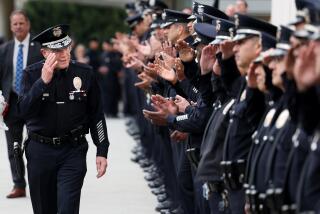THE POLICE BEAT GOES ON : Taking the Politics Out of Government Has Helped Keep Daryl Gates in Office
The drama of Daryl Gates has attained the status of a Hillcrest Country Club poker game: Now it be longs to the kibitzers. As an innocent bystander in good bystanding, I’m convinced that the brutal spectacle recorded on George Holliday’s videotape (do we have to run a copyright symbol next to his name?) is the strange, twisted end of a trail that began early in this century as the sun-dappled path of reform.
It was the Progressives--hey, their name even implies progress!--who promoted the idea that the main thing wrong with government in this country was that there was too damn much politics in it. Today, that notion seems as quaint as the idea of fixing what’s wrong with vegetable soup by taking all the green and yellow things out of it.
Thanks to this peculiar ideal, Los Angeles politics has long been a murky, off-putting shadow play. Legally, there can be no Republicans, no Democrats in city government. Without parties, all politics becomes personal, sub rosa, difficult for the average person to follow. Progressive reform has kept politics out of government the way the R rating has kept teen-agers out of movie theaters. Reform did succeed in boring or confusing citizens out of politics.
Law enforcement was a particularly egregious example of the old way of doing things, so it had to be particularly de-politicized. Like the early LAPD, the early FBI was notoriously corrupt. Daryl Gates inherited from his predecessors the same strange bargain that J. Edgar Hoover struck on the federal level: If you want a clean force, give me the badge and leave me alone for the rest of my life.
What we got in both cases was a law enforcement agency widely publicized as incorruptible, and less widely known for its sense of isolated superiority--isolated from the larger community and superior to any inconvenient laws that that community might pass. Chiefs of both agencies didn’t just enjoy their insulation from control by politicians; they began controlling the politicians, either provably (in Hoover’s case) or allegedly (in Gates’ case) maintaining files on the proclivities, prurient or otherwise, of anybody deemed a potential enemy. The files might be kept secret, or they might be shared with special friends.
Both the FBI and the LAPD found wars against enemies increasingly more attractive than nasty old law enforcement. In the ‘60s and ‘70s, both agencies infiltrated any political group whose beliefs or leaders the Chief-Cop-For-Life didn’t approve of. Meanwhile, real crime-fighting suffered. J. Edgar Hoover explained his agency’s failure to make a dent in post-Capone organized crime by denying that organized crime existed. There was, Hoover and Joey Gallo kept insisting, no such thing as the Mafia. The LAPD, for all its success in infiltrating peace groups and supporters of Salvadoran rebels, apparently has never managed to sneak an agent into the Bloods or the Crips.
Hoover, who peeped at the sex life of Martin Luther King Jr. while fashioning a rather secretive career as a “lifelong bachelor,”had to die before anybody attempted to straighten out the FBI. To fix the LAPD, our local political system had to turn to a commission.
In movies, when people in government come up against a knotty problem, they turn to a two-fisted guy with a great build, a short haircut and a dazzling girlfriend. In real life, they appoint a commission. During the ‘80s, a commission wrestled with the Social Security tar baby, keeping the fund from plunging into bankruptcy. A commission resolved all doubts about the JFK assassination for all time. And, while the City Council hid in its chamber waiting for the aftershocks to subside, a commission hewed a door out of a stone wall and showed that door to Daryl Gates.
Not only can politics not be kept out of government (ask the Police Protective League how political the LAPD is), but politics belongs in government. It’s a natural part of all human organization, and by expecting government to be magically different, we set standards guaranteed to disappoint. We view politicians with such disdain because we expect them to act as we never would. Wouldn’t you prefer to give jobs to your friends and relatives? Wouldn’t you give yourself a raise if you could?
The Eastern Europeans are coming here to learn the art of democratic government from the masters. What are we telling them--limit discussion to 30-second TV spots, discourage voting and turn any real problems over to a commission?
More to Read
Get the L.A. Times Politics newsletter
Deeply reported insights into legislation, politics and policy from Sacramento, Washington and beyond. In your inbox three times per week.
You may occasionally receive promotional content from the Los Angeles Times.










